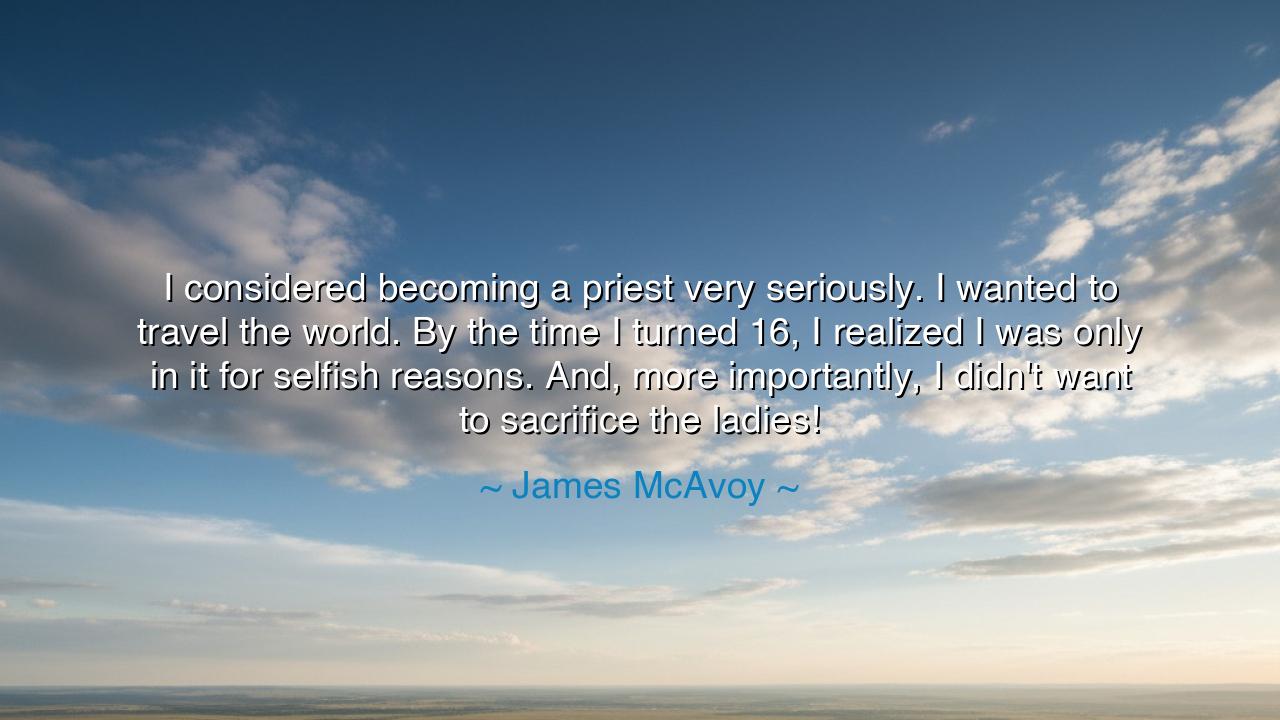
I considered becoming a priest very seriously. I wanted to
I considered becoming a priest very seriously. I wanted to travel the world. By the time I turned 16, I realized I was only in it for selfish reasons. And, more importantly, I didn't want to sacrifice the ladies!






The words of James McAvoy — “I considered becoming a priest very seriously. I wanted to travel the world. By the time I turned 16, I realized I was only in it for selfish reasons. And, more importantly, I didn’t want to sacrifice the ladies!” — strike the ear at first with humor, yet beneath the laughter there lies a wisdom about self-knowledge, honesty, and the courage to abandon false callings. In these words, the actor reveals the eternal struggle between duty and desire, between the noble image of a path and the true intention of the heart.
To long to be a priest is to long for a sacred life, one dedicated to service, faith, and sacrifice. It is a noble aspiration, but McAvoy confesses that his yearning was not rooted in devotion, but in the excitement of travel and adventure. He sought the robes of holiness, but not the weight of holiness itself. And here lies the wisdom: better the honest man who admits his selfishness, than the false saint who cloaks ambition in piety. For to walk a path without sincerity is to deceive not only others, but oneself.
This struggle is as old as time. Recall the story of Siddhartha Gautama, who left his palace not for glory, but to find truth. His renunciation was not of women or wealth for selfish longing, but for the awakening of the soul. Contrast this with those who donned sacred robes throughout history not out of faith, but for power, prestige, or escape from worldly burdens. Such men could not endure the true trials of their calling, for their motives were shallow. McAvoy, in youthful honesty, chose not to walk the path of falsehood, but to follow the truth of his heart, even if it led elsewhere.
There is also a lesson here about desire. The admission, “I did not want to sacrifice the ladies,” though spoken with jest, reveals a deeper truth: that one must honor the pulls of human nature rather than deny them hypocritically. Many have taken vows they were not prepared to uphold, and in doing so, brought pain upon themselves and others. To know one’s own limits, to recognize where sacrifice is too great, is not weakness but wisdom. For it is better to live authentically in the light of one’s humanity than to stumble in shadows of false renunciation.
The heroism here lies not in choosing the life of a saint, but in daring to admit that one’s motives were not pure. How many continue along paths they know are not theirs, for fear of judgment, tradition, or pride? How many live lives that are performances, rather than truths? McAvoy’s youthful clarity reminds us that courage is not always in embracing sacrifice, but sometimes in confessing one’s inability to make it. Such confessions free us from the chains of expectation and guide us toward the path that is truly ours.
The lesson, then, is clear: before committing to a great path, examine your heart. Ask yourself not only what the world will see, but what the soul will bear. Are you pursuing this calling for love, for truth, for service? Or for vanity, escape, or secret desire? To know the answer is to walk with integrity. To deceive yourself is to sow suffering.
Practical actions follow naturally. Look within, with honesty and without fear. If you choose sacrifice, let it be for the right reasons — reasons that align with your deepest values. If you choose instead a worldly path, embrace it with joy, without shame, for there is no dishonor in living authentically. Do not bind yourself to roles that are masks, but rather, shape a life that reflects your true essence. For in truth, whether in sacred vows or in worldly loves, there lies the nobility of the human spirit.
So remember, child of tomorrow: the measure of a life is not in the grandeur of the path chosen, but in the truth with which it is walked. To aspire is noble, but to be honest about one’s aspiration is greater still. The Buddha taught sincerity, Christ taught sacrifice, and McAvoy — in his youthful jest — teaches us this: that to know oneself and to live truthfully is better than to pretend to a holiness one cannot bear. In this honesty, there is freedom, and in freedom, there is peace.






AAdministratorAdministrator
Welcome, honored guests. Please leave a comment, we will respond soon